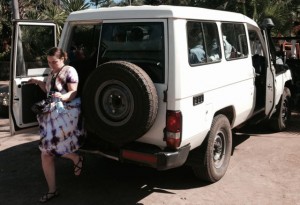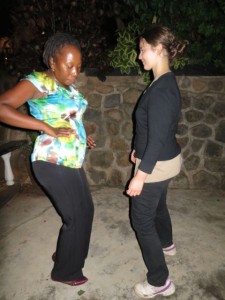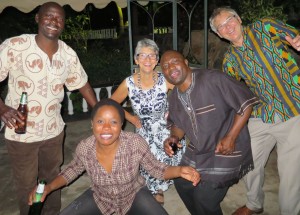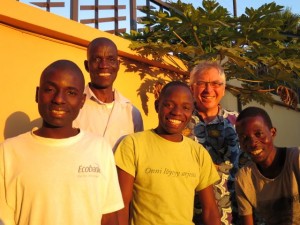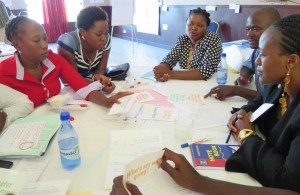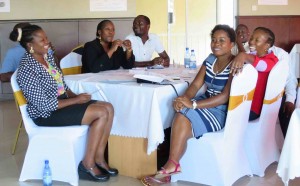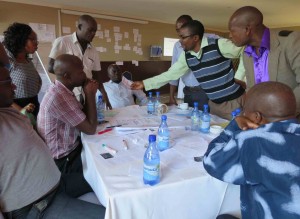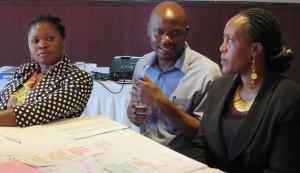18 months have gone so fast! Suddenly it’s time to leave and say good bye to so many friends that we feel as if we have known for years. The last M&E Technical Working Group was held in Zomba, the old colonial capital of Malawi (then Nyasaland). As usual for the Brits it is set in a high, cooler location with less Malaria. We had an extra day to finish off the Centralised Data Base submission, the Data Quality Assurance Program, develop a job description for a National M&E Coordinator and other items. It was also an open secret that some surprise was being organised, with Debbie and Helen being invited along as well. Next Stop Geelong.
Category Archives: training
Facilitation Fundamentals – Theory & Practice
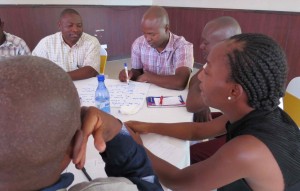
Richard scribing participants views of facilitation after doing a Lit Review
My observation is that there is a serious gap between rhetoric and reality in the international development world. There are people with positions called ‘field facilitators’ but with job descriptions based on achieving outputs such as ‘Numbers of people trained in …. ‘
or ‘Number of villages declared ODF’. Similarly donors require workshops exploring ‘lessons learned’, but in practice everyone looks at their laptop before making a presentation and the most senior person makes a few comments that get noted as the ‘lessons learned’. I have been trying to show a few different ways of doing things, and CU asked me to run one day courses on ‘everything I know about those workshop techniques I’ve been using’.
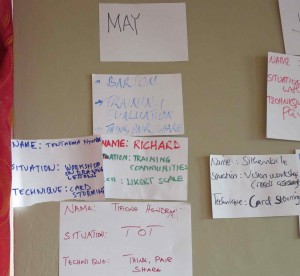
At the end of the session I asked each to make a commitment to try out at least one of the techniques that they’d used during the day. They all seemed very keen to do so which was gratifying.
As the organisation is spread across quite a wide area, yesterday was the first of four. I managed to demonstrate, and/or they practiced in the course of unpacking this thing called facilitation:
History wall, Lit Revew, NGT, Poster Process, Noisy RR, Silent RR, Card storming, Think/Pair/Share, Likert Scales and a long stream of introductions (as arrival times are always erratic). The group provided some hilarious energisers, which were slightly risqué but nothing compared with Village Dancing
I will of course make some changes, one of which will be to run a session on ground rules, with a question about mobile phone use….
Impact Report 1
All aid agencies want to demonstrate that they’ve made an impact. My current big job is to write the 2013 -14 Concern Universal Malawi Impact Report, which has been (and continuous to be) an interesting exercise. The problem is……..multitudinous.
Concern Universal Malawi is a complex organisation – a few points to illustrate:
- CU Malawi’s goal is (as is normal today) an outcome viz: ‘to have made a lasting improvement in peoples lives’.
- It currently implements approximately 23 diverse projects at various stages of completion.
- It has eleven operating centres (offices) and works in nine Regions across Malawi
- Funding for projects and programs comes from approx. 21 different donors. Each donor has it’s own agenda and reporting requirements.
- There is a combination of different projects and sub-projects, sometimes with different donors.
- There is encouragement to work with ‘partners’. With no definition of what a partnership is, there are multiple working relationships with other bodies.
With each project having it’s own goals, M&E and reporting system I have approached the problem using grounded theory, looking at the data available and seeing what emerges. I now have information and stories across nine different themes from all projects.
- Advocacy and Social Inclusion
- Agricultural Production
- Economic Development
- Environmental Sustainability
- Farm and other inputs
- Health and Nutrition
- WASH (Water, Sanitation & Hygiene)
- Working with Others
In addition, ’Impact Reports’ are necessarily subjective (as they report on the broader system, which is by definition value laden), and dependant on not just the authors but also the intended recipients. The main intended audience of such a report are the donors, but with a desire that it should be ‘rigorous’ and ‘not just a PR exercise’. I am thus also running it as a development exercise for staff, which I hope will allow them to better understand the organisation they work in, and also provide the opportunity for them to say what they want to say with regard to ‘impact’.
Using posters developed for each theme (and the ‘poster process’) I have now taken it to one team (Sugar Producers Capacity Building) for their reflections and input. Along with others, their input will then contribute to the ‘learnings’ for a document later tailored for the donors. Maybe… one day… we could get staff and donors in the same room…….

Staff comments on Environmental Sustainability activities impact: Reduction in tree cutting because of promoting solar lamps and CM stoves
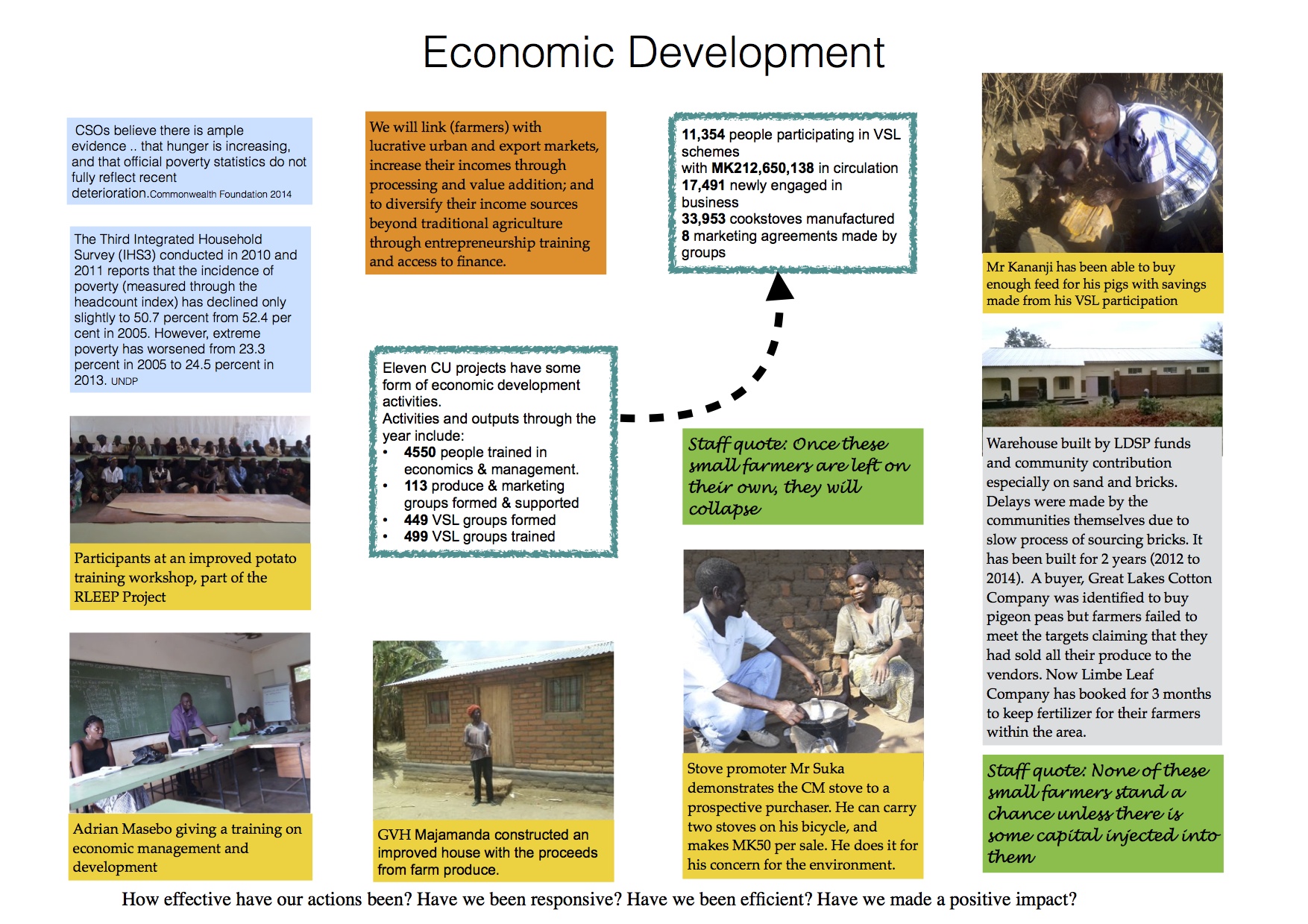
Staff comments on ‘Pro-poor’ Economic Development activities – Fairly good impact on linking farmers to lucrative markets as witnessed by the involvement and contribution of Fairtrade: Excellent impact on Village Savings & Loans (the numbers speak for themselves and they are screaming): More projects featuring economic development activities. Great pickup on stoves by communities
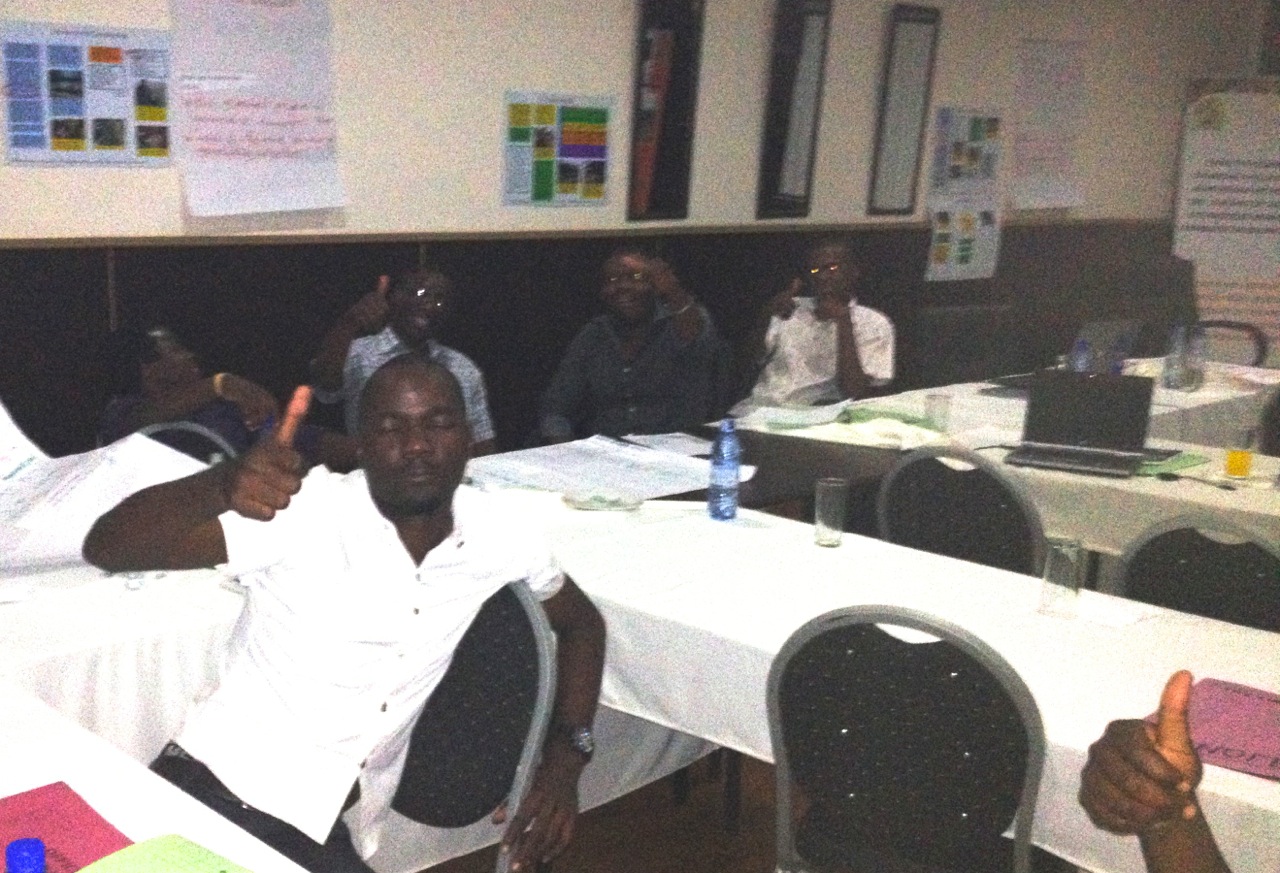
Thumbs up by the Sugar Project staff for the poster process (carried out after they’d had a long day in Fair Trade training). Note 3 of 13 posters on wall behind.
Theatre Act 2
Warning: This Blog might offend. Do not read further if unable to accept different cultural practices and realities.
Most rural Malawians live a life that is sometimes described as being ‘One with Nature’. For many in the villages a good household income might be $500/year. Thus for almost all, life is dictated by the seasons, food you can grow, any animals you have and most importantly your relationships with those around you. It is not an environment that stimulates or promotes individual creativity or personal initiative. Unfortunately it also means an average life expectancy of 54, with diarrhoeal diseases being in the top three causes of death. Whilst resources might be minimal, with the exception of the very poor village people are not completely deficient. However effecting cultural change is not easy, and for the most part only something that occurs by individual personal choice. As with most rural communities Malawian villagers are conservative and reluctant to change long held cultural practices. The Community Lead Total Sanitation (CLTS) program is designed to ‘trigger’ cultural change occurring within a group of people who effectively live ‘One with Nature’. The cultural change in this instance is for the village to become an ‘Open Defication Free’ (ODF) village with one latrine per household.
Thus following the hygiene promotion activities (see previous post) and a lunch of soft drink and bread, this second demonstration of the triggering process for the Group Village Headmen moved outside. Whilst the guys had been talking about hygiene inside, Fiona had asked some of the children where those in the village defecate.
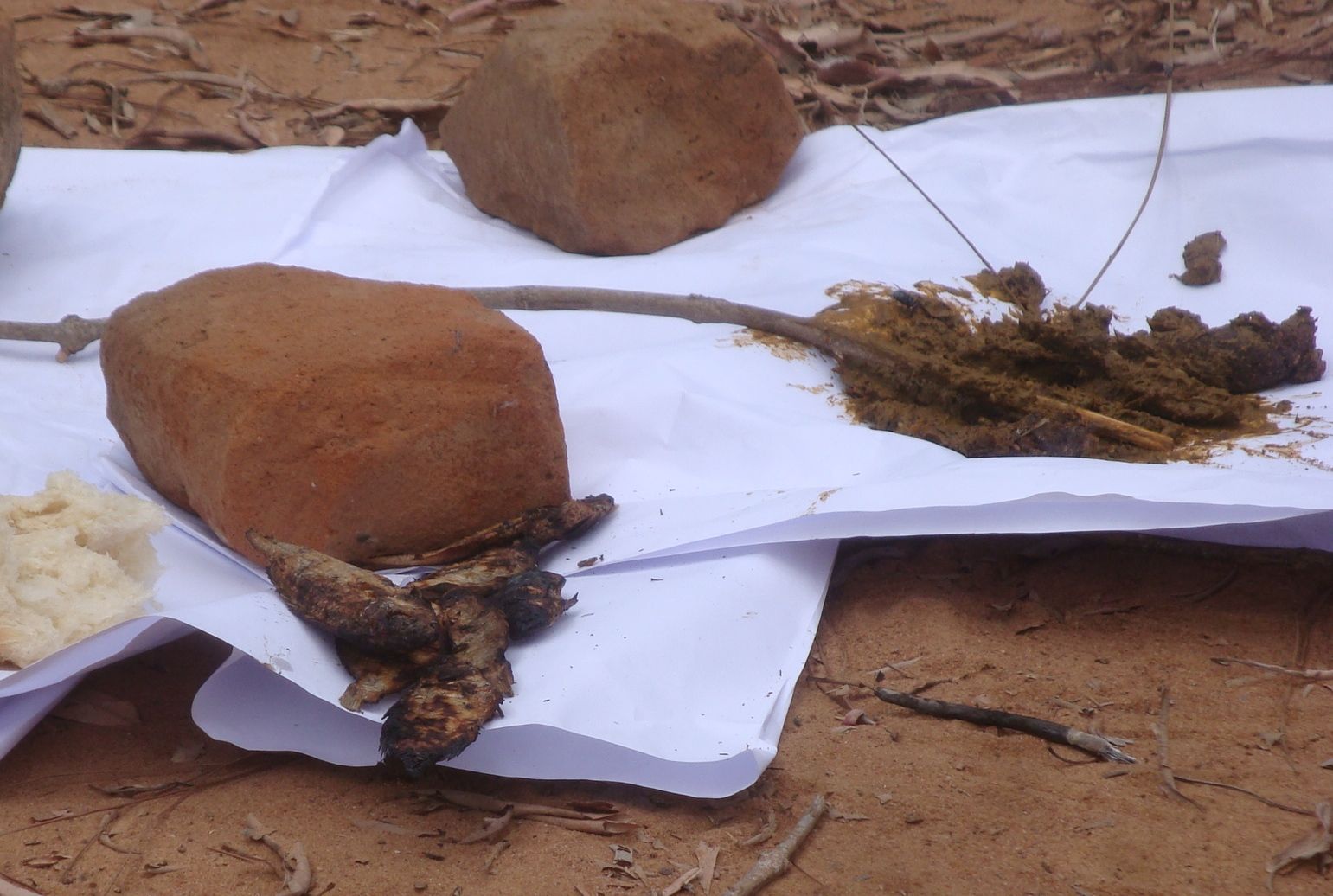
Bread, fish & faeces.
The triggering process itself starts with lighting a small fire to cook a local delicacy, common in the markets; in this case some small fish. These are then laid out close to some faeces recently collected from the surrounding bush. With a facilitated discussion about hygiene and flies the fish are then offered to the participants.
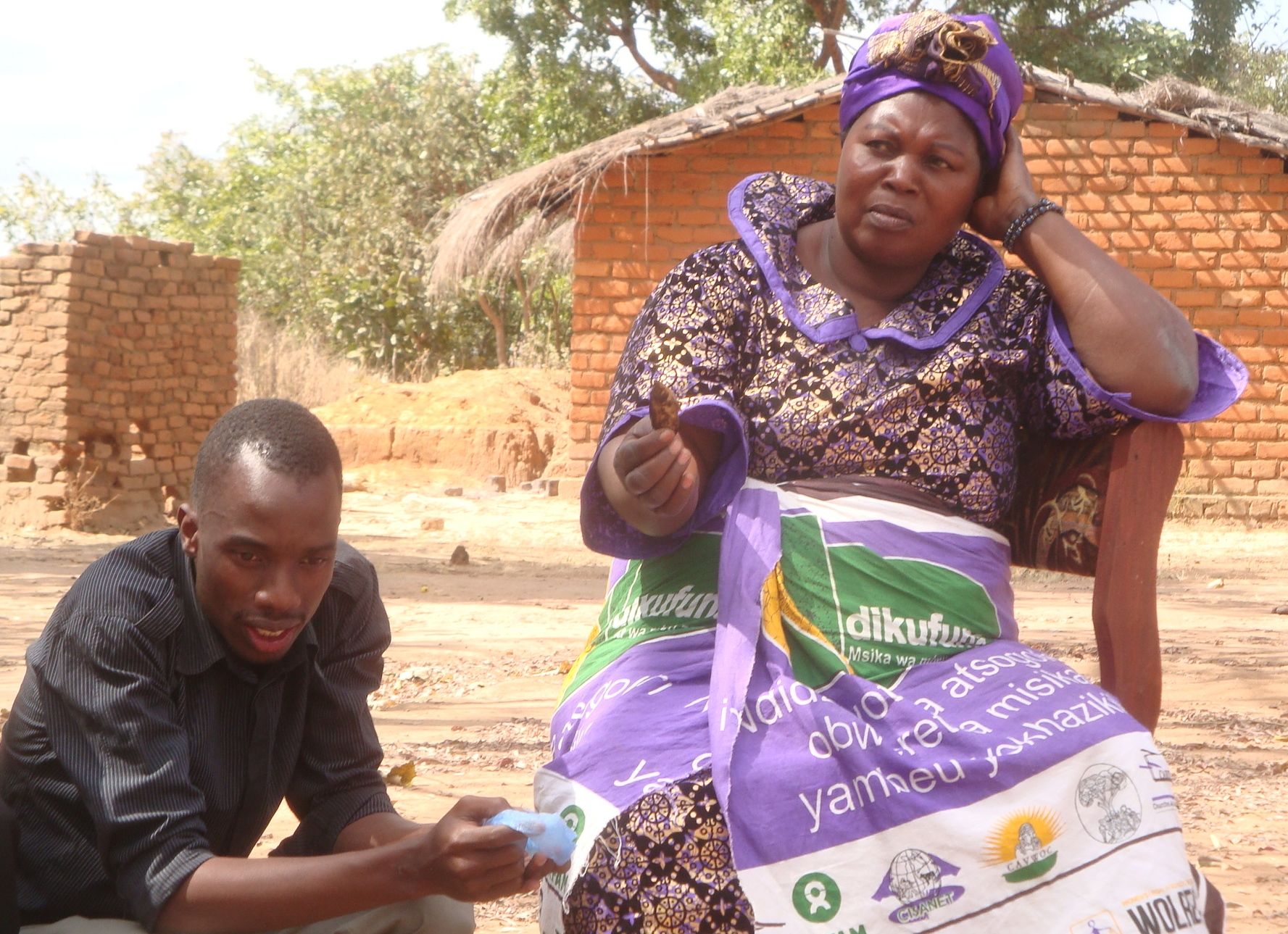
First offered to the most senior person in the group, in this case the TA (Traditional Authority), she was not keen to eat the proffered snack.
After the ‘triggering’ event, the field facilitators look for the ‘natural leaders’. Natural leaders are those who suggest that the village change cultural habits, and that they should start building latrines. No finance or other incentives are provided, however one of the field facilitators suggested that a catalogue of different solutions available would be useful. It makes me think that a variation on the poster process might be appropriate. I’m also left thinking how this concept might be used for changing other long held but ultimately dangerous cultural practices. What about the dangers of hierarchical bureaucracies?
Mainstreaming
‘Mainstreaming’ – a term that I had not come across before arriving at CU in Malawi. Over the last ten years there has been a variety of projects and programs promoted by the donor agencies to address the ‘flavour of the month’ issue. These include human rights, environmental sustainability, gender equality and HIV awareness. Initially funded as separate ‘one off’ target programs these ‘new paradigm’ issues are now integrated (or mainstreamed) into other projects and programs.
My colleague Thokozani, who is responsible for mainstreaming ‘euality’ had arranged to run a 3 1/2 day session as part of the Capacity Building for Sugar Outgrowers project. This EU/Solidaridad funded project is designed to increase the capacity of small scale sugar producers and the sugar industry in general. I was flattered when she asked me to assist design the running sheet. Whilst she was confident about delivering a whole variety of different ways to achieve her goals, I have to admit to being a little skeptical about her actually delivering them when the time came. Oh one of little faith!
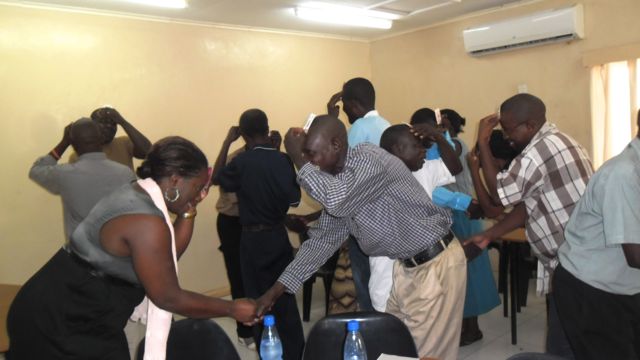
Participants exploring how they interact with others of different social rank using Sivasailam Thiagarajans playing card role play activity.
When reporting back on the workshop she was excited about how it had all gone, and how engaged the participants were. Some of the techniques she used were:
- A ‘lit review’ for the group to define ‘equality’ (their answer ‘Equal participation and access by all’)
- A ‘poster process’ to explore Human Rights.
- The DEPI designed ‘bi-focal’ in which first the men, then the women spoke about what it was like to be that gender in the sugar industry.
- The Sivasailam Thiagarajan role play activity where participants have to ‘wear’ a playing card (KQJ 10-6 randomly dealt) and treat each other according to their rank.
- Conversation cards to help discussion on furthering equality in the industry.
- Finally, a comprehensive action plan to overcome blockages to equality in the sugar industry
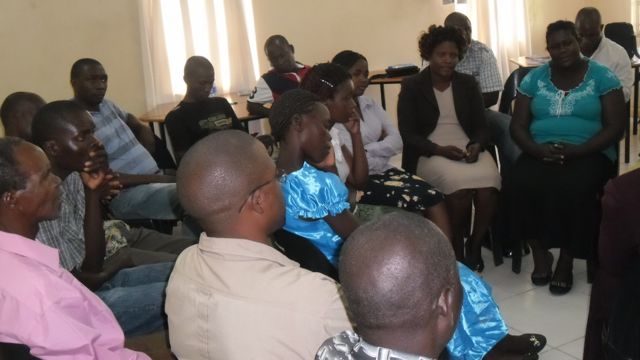
The women discussing what it’s like to be female in the sugar industry, while the men listen, using the DEPI bi-focal process
I regret not being able to be at the workshop, but am looking forward to working further with her.

